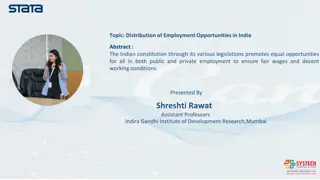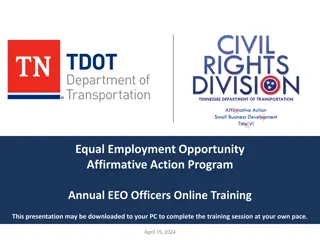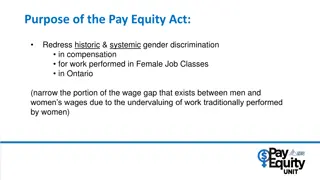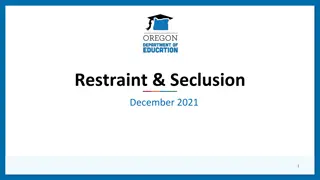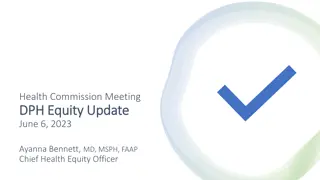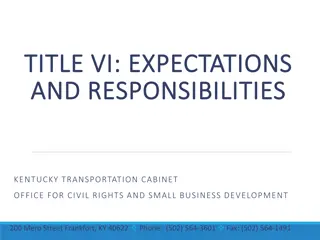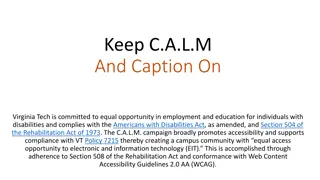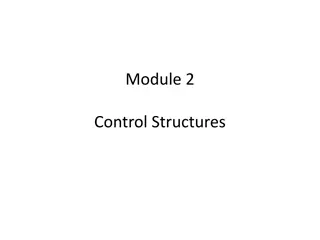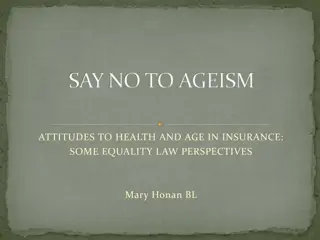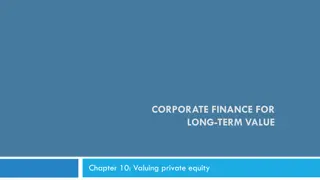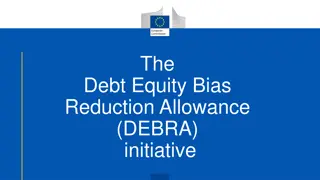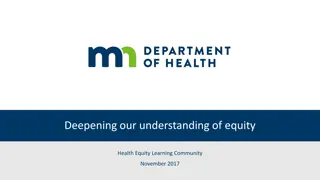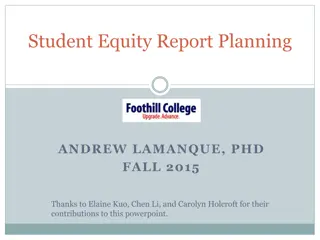Equity Compliance Office: Ensuring Equal Opportunity and Nondiscrimination
The Equity Compliance Office at Bowie State University promotes equal opportunity and investigates discrimination complaints based on various protected characteristics. They ensure compliance with federal and state laws, handle reasonable accommodation requests, and provide training for supervisors on EEO, ADA, and sexual misconduct issues.
Download Presentation

Please find below an Image/Link to download the presentation.
The content on the website is provided AS IS for your information and personal use only. It may not be sold, licensed, or shared on other websites without obtaining consent from the author. Download presentation by click this link. If you encounter any issues during the download, it is possible that the publisher has removed the file from their server.
E N D
Presentation Transcript
Equity Compliance Office EEO, ADA & Sexual Misconduct Training for Supervisors Alanna Dennis, Esq., Director Liza Almo, Esq., Title IX & EEO Compliance Specialist
Equity Compliance: Who are we and what do we do? Equity Compliance assists with reasonable accommodation requests and investigates internal discrimination complaints based on a person s protected basis per BSU policies, federal, state and local laws, including, but not limited to, the following: Race Personal Appearance Color Disability Sex Age National Origin Ancestry Religion Marital Status Family Status Veteran Status Genetic Information Sexual Orientation Pregnancy Gender Identity or Gender Expression
Applicable Federal Laws Equal Pay Act of 1963 Title VII of the Civil Rights Act of 1964, as amended Age Discrimination in the Employment Act of 1967 Title IX of the Education Amendments of 1972 Pregnancy Discrimination Act of 1978 (amended Title VII) Americans with Disabilities Act of 1990, as amended by ADAAA of 2008 Genetic Information Nondiscrimination Act of 2008
State of Maryland Law Pursuant to State Government Article 20-602, Annotated Code of Maryland, individuals are guaranteed equal opportunity in receiving employment and in all labor management-union relations regardless of race, color, religion, ancestry or national origin, sex, age, marital status, sexual orientation, gender identity, disability, or genetic information. Maryland Law also prohibits discrimination for a disability due to pregnancy or childbirth.
BSUs VI-1.00 - Policy on Affirmative Action and Equal Opportunity Bowie State University shall not discriminate against any individual on the basis of race, color, religion, age, ancestry or national origin, sex, sexual orientation, disability, marital status or veteran status. All policies, programs, and activities of Bowie State University are and shall be in conformity with all pertinent Federal and state laws of nondiscrimination including, but not limited to: Title VII of the Civil Rights Act of 1964, as amended, Title IX of the Education Amendments of 1972, Equal Pay Act of 1963, Age Discrimination Act, Sections 503 and 504 of the Rehabilitation Act of 1973 and the Americans with Disabilities Act of 1990, Federal Executive Order No. 11375, and Article 49B of the Annotated Code of Maryland. This commitment applies in all areas and embraces faculty, staff, and students.
BSUs Core Values The University s core values are: excellence, civility, integrity, diversity and accountability. We highlight three of the core values: Civility Bowie State University cultivates an environment in which the interaction between individuals is one that is inherently imbued with value, respect, and appreciation. Integrity Bowie State University students, faculty, staff, administrators and the larger community demonstrate high ethical standards in their interactions with one another. Diversity Bowie State University nurtures an awareness of, and sensitivity toward, differences of race, gender, ethnicity, national origin, culture, sexual orientation, religion, age, and disability.
What does BSUs core values of Diversity, Civility, Integrity have to do with Equity Compliance? The Answer: Everything! Diversity includes our unique experiences we each bring to the table. By treating each other with civility, respect and integrity, we are helping in the prevention of harassment and discrimination. As such, Managing Diversity is a conscious choice and a commitment by an organization to VALUE differences by using diversity as a source of strength to achieve our organizational goals, and by creating a culture that encourages full engagement, respect, integrity, civility, collaboration, fairness and equity.
What are your Roles & Responsibilities as Directors, Managers & Supervisors? Supervisors and managers are held responsible for a work environment free of discrimination and harassment. Stay alert to potential areas of discrimination, i.e recruitment and retention, career development and promotion. Ensure the workplace/campus community is fair for all employees, including our students. This means a supervisor has a duty to act and follow the process by reporting to Equity Compliance any and all concerns of alleged discrimination and harassment. Help in the enforcement of BSU s EEO Policy and Sexual Misconduct Policy, and help to prevent retaliation.
Directors, Managers & Supervisors: Responsibilities in the EEO Process continued... The work atmosphere should provide employees with the opportunity to succeed and be fully productive. Practicing effective listening to reduce the frequency of interpersonal conflict and increase the likelihood that when conflicts emerge they can be quickly identified and addressed. Set the Example model appropriate behavior. Educate employees on appropriate behavior. When an employee feels threatened by hostility in the office, he/she may not be able to perform at his/her highest potential.
What is Discrimination? It is treating a person differently on the basis of one of the protected categories: race, color, religion, ancestry or national origin, sex, age, marital status, sexual orientation, gender identity, disability, or genetic information
Discrimination Theories What is disparate treatment? Treating applicants or employees differently than similarly situated individuals because of their membership in a protected class or category. The employer s actions are motivated by discriminatory intent that can be proven by direct or circumstantial evidence. What is disparate impact? When a policy or employment practice is facially neutral but nonetheless discriminates against individuals of a particular protected class or category. Facially neutral means that a policy or practice does not make a specific reference to the protected category.
Disability Discrimination The Americans with Disabilities Act does not protect everyone with a medical condition. In order to be protected, a person must be qualified for the job and have a disability as defined by the law. A person can show that he or she has a disability in one of three ways: A person may be disabled if he or she has a physical or mental condition that substantially limits a major life activity (such as walking, talking, seeing, hearing, or learning). A person may be disabled if he or she has a history of a disability (such as cancer that is in remission). A person may be disabled if she or he is believed to have a physical or mental impairment that is not transitory (lasting or expected to last six months or less) and minor (even if s/he does not have such an impairment).
Reasonable Accommodations under the ADA Equity Compliance also handles requests for reasonable accommodations from individuals with disabilities. A reasonable accommodation is any modification or adjustment to a job, an employment practice, or work environment that makes it possible for a qualified individual with disability to enjoy an equal employment opportunity. Examples: Wheelchair Accessibility Interpreter Reasonable Accommodations help persons with disabilities enjoy the benefits and privileges of employment. Upon receipt of a request for reasonable accommodation, an interactive discussion with the employee and supervisor will ensue.
ADA and Undue Hardship ADA reasonable accommodations will be provided unless they cause an undue hardship. Factors of consideration in determining whether an undue burden exists includes, but is not limited to, the costly nature of the request, compromises to workplace safety, or whether it requires other employees to do more than their share of potentially hazardous or burdensome work.
What is Sex-Based Discrimination? Discrimination against an individual because of a person s sex, gender identity, including transgender, or because of sexual orientation is discrimination because of sex in violation of Title VII. Treating a student, job applicant or employee unfavorably because of that person's sex, sexual orientation. Sex discrimination also can involve treating someone less favorably because of his or her connection with an organization or group that is generally associated with people of a certain sex or sexual orientation.
What is Sexual Misconduct? Sexual Misconduct is strictly prohibited by state and federal law, as well as by BSU Policy. BSU Policy defines Sexual Misconduct as a type of sex discrimination that may include the following: Sexual Harassment Sexual Violence Sexual Exploitation Dating Violence Domestic Violence Sexual Intimidation Stalking 16
What is Sexual Harassment? Sexual Harassment is against the law! It is a form of sex discrimination that violates Federal, state and local laws. Harassment may include: offensive remarks about a person's protected categories, such as a person s sexual orientation or gender expression. the law does not prohibit simple teasing, offhand comments, or isolated incidents that are not very serious harassment is illegal when it is so frequent or severe that it creates a hostile or offensive work environment or when it results in an adverse employment decision such as the victim being fired or demoted The harasser can be the victim's supervisor, a supervisor in another area, a co-worker, or someone who is not an employee of the employer, such as a client or customer.
Sexual Harassment Defined Quid pro quo: (means this for that ) an abuse of power where unwelcome sexual advances; unwelcome requests for sexual favors; or other verbal or physical conduct of a sexual or gender-based nature is explicitly or implicitly a term or condition of an individual s employment. Hostile work environment: the conduct is so severe and pervasive as to create a hostile, offensive or intimidating work environment. Hostile is evaluated based on both the subjective (the complainant s) and objective (reasonable person s) perspective.
Sexual Harassment Contd. Sexual harassment can be committed based upon an individual s sex, gender identity, sexual orientation or gender expression. Sexual harassment is one-sided, it is not consensual. Sexual harassment can also occur between equals (e.g., student to student, staff to staff, faculty member to faculty member) or unequal power status (e.g., student to faculty member). Examples of Sexual harassment include, but are not limited to: sexual pranks or repeated sexual teasing, jokes or innuendo, unnecessary touching or grabbing another s body or clothing. DUTY TO REPORT sexual misconduct! 19
Know Your Obligations Responsible employees, identified in Section VI. B. of the BSU Policy, are those employees required to share reported details and personally identifiable information to the Title IX Coordinator. Faculty, Supervisors, Administrators, Coaches, Advisors to Student Organizations, Resident Directors and Assistants are Responsible Employees. The University requires Responsible Employees to report all incidents of sexual misconduct to the Title IX Coordinator, Alanna Dennis, Esq. at (301) 860-3442. Confidential employees are those employees holding positions provided in Section VI. C. of the Policy who will not report any details or personally identifiable information shared with him or her without consent, unless the information relates to an imminent threat to the health or safety of an individual or the University community. Concerns of imminent danger to others should be reported to Campus Safety at (301) 860-4040.
What is Pregnancy Discrimination? It is treating an applicant or employee unfavorably because of pregnancy, childbirth, or a medical condition related to pregnancy or childbirth. The Pregnancy Discrimination Act forbids discrimination based on pregnancy when it comes to any aspect of employment, including hiring, firing, pay, job assignments, promotions, layoff, training, fringe benefits, such as leave and health insurance, and any other term or condition of employment. Maryland law states that disabilities caused or contributed to by pregnancy or childbirth: 1) are temporary disabilities for all job-related purposes; and 2) shall be treated as temporary disabilities under any health or temporary disability insurance or sick leave plan available in connection with employment. Maryland State Government Article, 20-609(f): http://law.justia.com/codes/maryland/2010/state-government/title-20/subtitle-6/20-609/
Temporary Disability Because of Pregnancy If a woman is temporarily unable to perform her job due to a medical condition related to pregnancy or childbirth, BSU must treat her in the same way as it treats any other temporarily disabled employee. Examples: provide light duty alternative assignments leave Impairments resulting from complicated pregnancy, such as gestational diabetes or preeclampsia (hypertension and protein in the urine) may be disabilities under the ADA. BSU may have to provide a reasonable accommodation for a disability related to pregnancy, absent undue hardship.
Pregnancy and Parental Leave An employer that allows temporarily disabled employees to take disability leave or leave without pay, must allow an employee who is temporarily disabled due to pregnancy to do the same. Pregnancy-related conditions cannot be singled out for special procedures to determine an employee's ability to work. However, if other non-pregnant employees are required to submit a doctor's statement concerning their ability to work before granting leave or paying sick benefits, then employees affected by pregnancy-related conditions must also submit such statements. The key is consistency. Under the Family and Medical Leave Act (FMLA) of 1993, a new parent (including foster and adoptive parents) may be eligible for 12 weeks of leave (unpaid or paid if the employee has earned or accrued it) that may be used for care of the new child. To be eligible, the employee must have worked at BSU for 12 months prior to taking the leave.
Equal Pay/Compensation Discrimination Men and women in the same workplace should be given equal pay for equal work. The jobs need not be identical, but must be substantially equal. Job content (not job titles) determines. All forms of pay are covered, including salary and benefits. If there is an inequality in wages, employers may not reduce the wages of either sex to equalize their pay. Complainants may go directly to court (not required to file an EEOC charge) within 2 years of the alleged unlawful compensation practice or, in the case of a willful violation, within 3 years.
What are my rights and what about retaliation? Retaliation is against the law and strictly prohibited. Students, faculty and staff equally regardless of sex/gender, race, color, national origin, etc. have the Right to File a Complaint either internally with Bowie State University s Equity Compliance Office, or externally with the Department of Education-Office for Civil Rights or the Equal Employment Opportunity Commission (EEOC). An employee or student may not be demoted, harassed or otherwise "retaliated" against because he or she filed a complaint and engaged in a protected activity. Retaliation occurs when an adverse action is taken against a covered individual because he or she engaged in a protected activity, such as filing a charge of discrimination, participating in a discrimination proceeding, or otherwise opposing discrimination.
Adverse Action Although supervisors can hold staff accountable, it should be well-documented and not done in a retaliatory manner. Examples of adverse actions by supervisors: termination, refusal to hire, and denial of promotion threats, unjustified negative evaluations, unjustified negative references, or increased surveillance it is unlawful for a worker's current employer to retaliate against him/her for pursuing an EEO charge against a former employer DO NOT include petty slights and annoyances, such as stray negative comments in an otherwise positive or neutral evaluation, "snubbing" a colleague, or negative comments that are justified by an employee's poor work performance or history.
Covered Individuals People who have opposed unlawful practices Participated in EEO proceedings Requested accommodations Individuals who have a close association with someone who has engaged in such protected activity. For example, it is illegal to terminate an employee because his/her spouse participated in employment discrimination litigation. Individuals who have brought attention to violations of law other than employment discrimination are NOT covered individuals. For example,"whistleblowers" who raise ethical, financial, or other concerns unrelated to employment discrimination are not protected.
Protected Activity Remember when an employee expresses opposition to a practice believed to be unlawful discrimination is a protected activity. Examples of protected activities: Complaining to anyone about alleged discrimination against oneself or others; threatening to file a charge of discrimination; picketing in opposition to discrimination; or refusing to obey an order reasonably believed to be discriminatory. Activities that are NOT protected opposition include: actions that interfere with job performance so as to render the employee ineffective; or unlawful activities such as acts or threats of violence.
Protected Activity Also participation in an employment discrimination proceeding is protected activity. Participation means taking part in an employment discrimination proceeding. Participation is protected activity even if the claims involved in the proceeding ultimately were found to be invalid. Examples: Filing a charge of employment discrimination; cooperating with an internal investigation of alleged discriminatory practices; or serving as a witness in an EEO investigation or litigation. A protected activity can also include requesting a reasonable accommodation based on religion or disability.
Other Forms of Discrimination: Race/Color Discrimination Race Discrimination: treating an applicant or employee unfavorably because he/she is of a certain race or because of personal characteristics associated with race (such as hair texture, skin color, or certain facial features). Color Discrimination: treating someone unfavorably because of skin color complexion. Race/color discrimination also can involve treating someone unfavorably because the person is married to or associated with a person of a certain race or color or because of a person s connection with a race-based organization or group, or an organization or group that is generally associated with people of a certain color. Ex. NAACP Discrimination can occur when the victim and the person who inflicted the discrimination are the same race or color.
National Origin Discrimination Involves treating applicants or employees unfavorably because they are from a particular country or part of the world, because of ethnicity or accent, or because they appear to be of a certain ethnic background (even if they are not). Also can involve treating people unfavorably because they are married to or associated with a person of a certain national origin or because of their connection with an ethnic organization or group. Discrimination can occur when the victim and the person who inflicted the discrimination are the same national origin.
Age Discrimination The Age Discrimination in Employment Act (ADEA) only forbids age discrimination against people who are age 40 or older. It is NOT illegal to favor an older worker over a younger one, even if both workers are age 40 or older. Discrimination can occur when the victim and the person who inflicted the discrimination are both over 40.
Religious Discrimination Involves treating an applicant or employee unfavorably because of his or her religious beliefs. The law protects not only people who belong to traditional, organized religions, such as Buddhism, Christianity, Hinduism, Islam, and Judaism, but also others who have sincerely held religious, ethical or moral beliefs. Religious discrimination can also involve treating someone differently because that person is married to or associated with an individual of a particular religion or because of his or her connection with a religious organization or group.
Religious Discrimination: Reasonable Accommodation The law requires to reasonably accommodate an employee's religious beliefs or practices, unless doing so would cause more than a minimal burden on the operations of the University. Examples: flexible schedule voluntary shift substitutions or swaps job reassignments modifications to workplace policies or practices
Religious Accommodation: Dress & Grooming Employees, applicants or managers should notify the Equity Compliance Office if they need an accommodation. The Equity Compliance Office will assist supervisors and employees in an interactive process to discuss the accommodation request. Religious accommodations may include dress or grooming practices that an employee has for religious reasons. Examples: wearing particular head coverings or other religious dress (such as a Jewish yarmulke or a Muslim headscarf) wearing certain hairstyles or facial hair (such as Rastafarian dreadlocks or Sikh uncut hair and beard) employee's observance of a religious prohibition against wearing certain garments (such as pants or miniskirts)
What is the Process as relates to Complaints Filed with Equity Compliance? 1. Know that the Equity Compliance Office functions as impartial, fair and neutral fact-finders and all investigations into the complaint allegations are strictly confidential. The information will only be discussed with pertinent individuals who need to know for purposes of the investigation and resolution. 2. As an employee, you should always feel free to report concerns to your chain of command. 3. If you have a concern and/or a complaint is brought to your attention of alleged discrimination, harassment or retaliation based on a person s protected basis, please bring the matter to the attention of Equity Compliance.
Complaints Filed with Equity Compliance continued 4. Individuals may always feel free to contact Equity Compliance directly if you have questions. 5. It is our practice to ask individuals to place their concerns in writing, i.e. complete our internal EEO complaint form, provide copies of supporting documentation and list of witnesses. The complainant and respondent are both equally given the same opportunity to provide information to Equity Compliance. 6. Upon completion of the investigation process, parties will be notified of the outcome of the investigation.
Final Reminders on How to Reduce Discrimination Be consistent employees use uniformity to measure discrimination. Employees compare what happens to them with what happens to their coworkers. Inconsistent treatment may initiate a complaint. 1) Laws, regulations, and policies should guide all personnel decisions. Familiarize yourself with BSU s policies that provide guidance on how to comply with laws and regulations. Even application of these laws will lessen BSU s vulnerability to discrimination complaints. 2) Use Job-Related Criteria To help avoid discrimination complaints, use job- related criteria for your personnel actions and decisions. Be prepared to give job-related reasons for any situation that you have handled differently in the past and for any deviation from standard procedure and practice. 3)
Steps to Reduce Discrimination Complaints continued Document Decisions Form a habit of documenting decisions and the reasoning behind them. This will greatly help you in explaining your decisions. 4) Resolve Problems Handle problems and disagreements when they arise. 5) Remember to Follow Policies Higher level supervisors may be held accountable for the decisions and actions of their subordinate supervisors. 6) When in doubt ask Human Resources and Equity Compliance! 7)
Questions and Contact Information Alanna Dennis, Esq. Director, Equity Compliance Office Phone: (301) 860-3442 E-mail: adennis@bowiestate.edu Liza Almo, Esq. Title IX & EEO Compliance Specialist Phone: (301) 860-3459 E-mail: lalmo@bowiestate.edu 41



